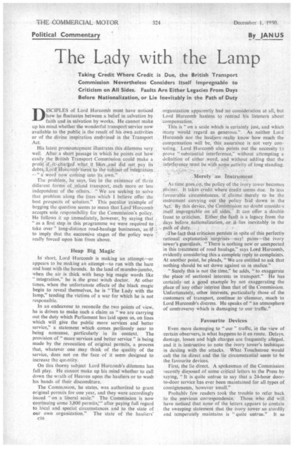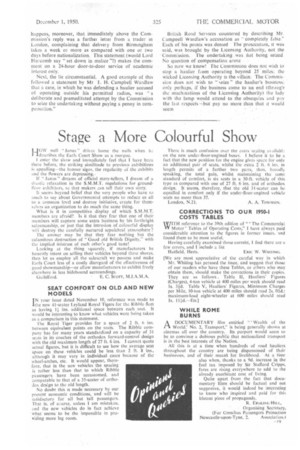Political Commentary
Page 58

Page 61

If you've noticed an error in this article please click here to report it so we can fix it.
The Lady with the Lamp
Taking Credit Where Credit is Due, the British Transport Commission Nevertheless Considers Itself impregnable to Criticism on All Sides. Faults Are Either Legacies From Days Before Nationalization, or Lie Inevitably in the Path of Duty
DISCIPLES of Lord Hurcomb must have noticed how he fluctuates between a belief in salvation by faith and in salvation by works. He cannot make up his mind whether the wonderful transport service now available to the public is the result of his own activities or of the divine inspiration enshrined in the Transport Act.
His latest pronouncement illustrates this dilemma very well. After, a short passage in which he points out how easily the British Transport Commission, could make a
profit if it . what . it likes and did not pay its debts;;;Lo'rd:1-111reorrib turns to the Suhjeot, of integratiOn
—" a word now corning into its own." . The problem, he says, lies in the existence of three different forms of inland transport, each more or less independent of the others. "We are seeking to solve that problem along the lines which I believe offer the best prospects of solution." This peculiar 'example of begging the question seems to mean that Lord'Hurcomb accepts sole responsibility for the Commission's policy. He follows it up immediately, however, by saying that "as a first step in this programme we were required to take over" long-distance road-haulage businesses, as.:if to imply that the successive stages of the policy were really forced upon him from above.
Heap Big magic In' short, Lord Hurcomb is making an attempt—or appears to be making an attempt—to run with the hare and hunt with the hounds. In the land of mumbo-jumbo, when the air is thick with heap big magic words like "integration," he is the great witch doctor. At other times, when the unfortunate effects of the black magic begin to reveal themselves, he is "The Lady with the lamp," tending the victims of a war for which he is not responsible.
In an endeavour to reconcile the two points of view, he is driven to make such a claim as "we are carrying out the duty which Parliament has laid upon us, on lines which will give the public more services and better service," a statement which comes perilously near to being nonsense, particularly in its context. The provision of "more services and better service" is being made by the revocation of original permits, a process that, whatever one may think of the quality of the service, does not on the face of it seem designed to increase the qmntity.
On this thorny subject Lord Hurcomb's dilemma has full play. He cannot make up his mind whether to call down the wrath of Heaven upon the hauliers or to wash his hands of their discomfiture.
The Commission, he states, was authorized to grant original permits for one year, and they were accordingly issued "on a liberal scale." The Commission is now continuing some 3,800 permits,'" after paying full regard to local and special circumstances and to the state of our own organization." The state of the hauliers' c16 organization apparently had no consideration at all, but Lord Hurcomb hastens to remind his listeners about "compensation.
"This is "on a scale which is certainly just, and which • many would regard as generous.": As neither Lord Hurcomb nor the haulierS -really know how much the compensation will be, this assurance is not very con . soling. Lord Hurcomb also points out the necessity to prove "substantial interference," without attempting a definition of either word, and without adding that the interference must be with sorpe.activity of long standing.
.Merely an rnstruthent
As time goes..on, the policy of the ivory tower becomes plainer. It takes credit where Credit seems due. In less favourable circumstances, it' claims' Merely to be the instrtiment carrying out the policy laid down in the Act: By this device, the Corrimission no doubt consideys itself impregnable on all sides.' It can offer a double
. front to criticism. Either the fault is a legacy from the days before. nationalization, or it-lies inevitably in the path of duty. '
:fThe fact. thai criticism persists in spite of this perfectly rational explanation' surprises—nay! pains—the ivory tower's guardian's. "There is nothing new or unexpected in this treatment of road haulage," says Lord Hurcomb, evidently considering this a complete reply to complaints. At another point, he pleads, "We are entitled to ask that nothing should be set down against us in malice."
"Surely this is not the time," he adds, "to exaggerate the place of sectional interests in transport." He has certainly • set a good example by not exaggerating the place of any other interest than that of the Commission. Unfortunately, other interests, particularly those of the customers of transport, continue to clamour, much to Lord Hurcomb's distress. He speaks of "an atmosphere of controversy which is damaging to our traffic."
Favourite Devices Even more damaging to "our" traffic, in the view of certain observers, is what happens to it en route. Delays, damage, losses and high charges are frequently alleged, and it is instructive to note the ivory tower's technique in dealing with the attacks. What Touchstone would call the lie direct and the lie circumstantial seem to be the favourite devices.
First, the lie direct. A spokesman of the Commission recently disposed of some critical letters to the Press by saying, It is quite untrue to say that a 24-hour doorto-door service has ever been maintained for all types of consignments, however small."
Probably few readers took the trouble to refer back to the mevious correspondence.. Those. who did will have noticed that none of the letters appears to contain the sweeping statement that the ivory tower so sturdily and temperately maintains is "quite untrue." It so
happens, moreover, that immediately above the Commission's reply was a further letter from a trader in London, complaining that del-Nei y from Birmingham takes a week or more as compared with one or two days before nationalization. This statement (would Lord Hurcomb say "set down in malice "7) makes the comment on a 24-hour door-to-door service of academic interest only.
Next, the lie circumstantial. A good example of this followed a statement by Mr T. H. Campbell Wardlaw that a case, in which he was defending a haulier accused ot operating outside his permitted radius, was "a deliberate and premeditated attempt by the Commission to seize the undertaking without paying a penny in Cornpen Sc lion." British Road Services countered by describing Mr. Campoell Wardlaw's accusation as completely false." Each of his points was dented The prosecution, it was said, was brought by the Licensing Authority, not the --Commission. The undertaking was not being seized. No question of compensation arose..
So now we know! The Commission does not wish to stop a haulier fiom operating beyond 25 miles; the wicked Licensing Authority is the villain. The Commission does not wish to "seize" the haulier's business: only perhaps, if the business came to an end (through the machinations of the Licensing Authority) the lady with the lamp would attend to the obsequies and pay the last-respects—but pay no more than that it would seem.












































































































